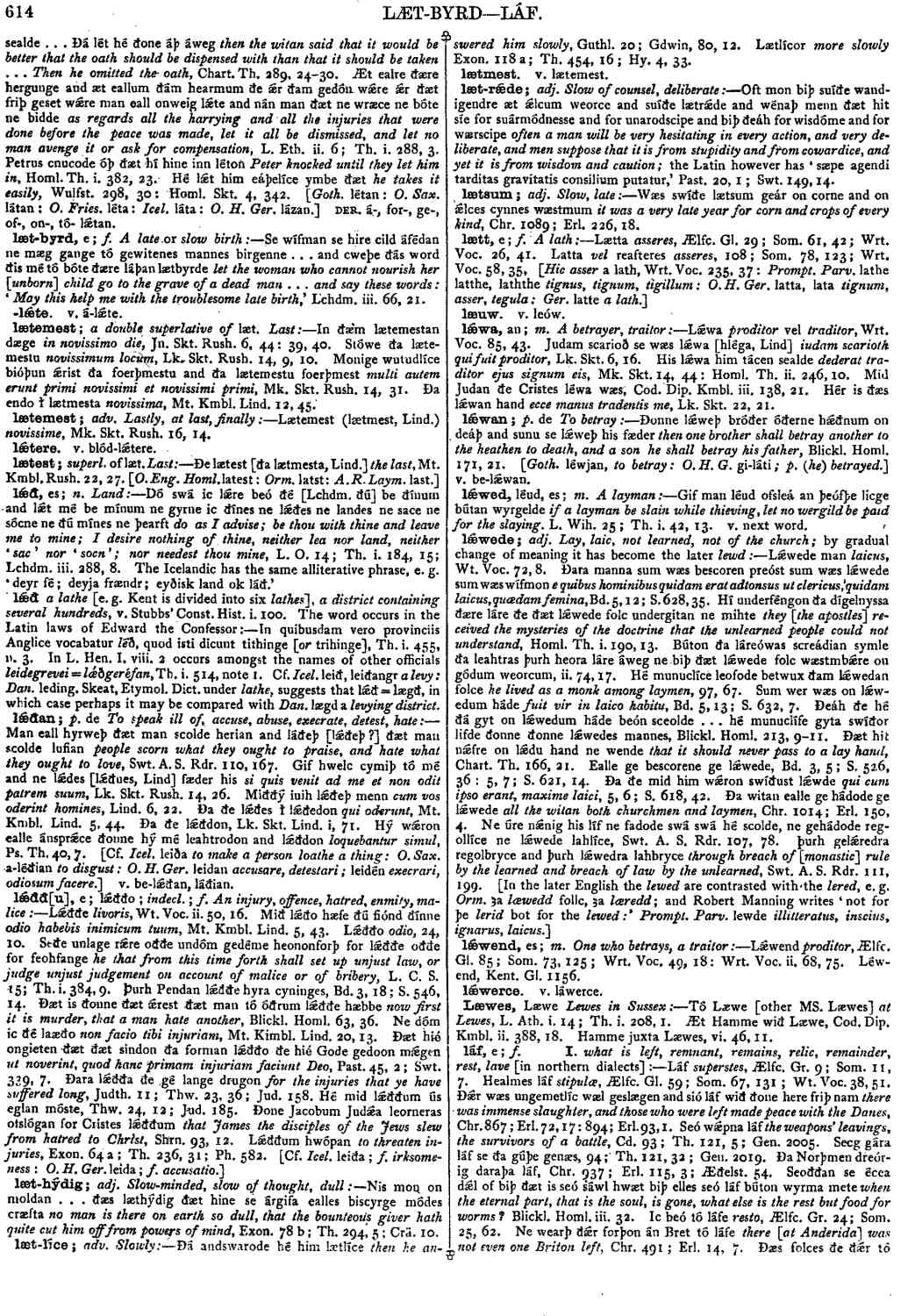láf
- noun [ feminine ]
-
Láf
superstes,
- Ælfc. Gr. 9 ;
- Som. 11, 7 .
-
Healmes láf
stipulæ,
- Ælfc. Gl. 59 ;
- Som. 67, 131 ;
- Wt. Voc. 38, 51 .
-
Ðǽr wæs ungemetlíc wæl geslægen and sió láf wið ðone here friþ nam
there was immense slaughter, and those who were left made peace with the Danes,
- Chr. 867 ;
- Erl. 72, 17 :
- 894 ;
- Erl. 93, 1 .
-
Seó wǽpna láf
the weapons' leavings, the survivors of a battle,
- Cd. 93 ;
- Th. 121, 5 ;
- Gen. 2005 .
-
Secg gára láf se ða gúþe genæs,
- 94 ;
- Th. 121, 32 ;
- Gen. 2019 .
-
Ða Norþmen dreórig daraþa láf,
- Chr. 937 ;
- Erl. 115, 3 ;
- Æðelst. 54 .
-
Seoððan se écea dǽl of biþ ðæt is seó sáwl hwæt biþ elles seó láf búton wyrma mete
when the eternal part, that is the soul, is gone, what else is the rest but food for worms?
- Blickl. Homl. iii. 32 .
-
Ic beó tó láfe
resto,
- Ælfc. Gr. 24 ;
- Som. 25, 62 .
-
Ne wearþ ðǽr forþon án Bret tó láfe
there [at Anderida] was not even one Briton left,
- Chr. 491 ;
- Erl. 14, 7 .
-
Ðæs folces ðe ðǽr tóláfe wæs,
- Blickl. Homl. 79, 20 .
-
Betǽcan eów on hǽðenra hand heries láfe
to deliver you into the hands of the heathen, all that is left of or by a host,
- Wulfst. 295, 20 .
-
Sumes þinges láfe
reliquiæ,
- Ælfc. Gr. 13 ;
- Som. 16, 19 .
-
Láfa árleásra forwurþaþ
reliquiæ impiorum interibunt,
- Ps. Spl. 36, 40 .
-
Wætra láfe
the survivors of the flood,
- Cd. 75 ;
- Th. 93, 21 ;
- Gen. 1549 .
-
Hí námon ða láfa
tulerunt reliquias,
- Mt. Kmbl. 14, 20 .
-
Ic eom wráðra láf fýres and feóle
I am the leaving of foes, of fire and of file [a sword, forged in the fire and sharpened by the file],
- Exon. 126 a ;
- Th. 484, 6 ;
- Rä. 70, 3 .
-
Homera láfa
swords,
- Beo. Th. 5651 ;
- B. 2829 :
- Exon. 102 b ;
- Th. 388, 14 ;
- Rä. 6, 7 :
- Chr. 937 ;
- Erl. 112, 6 ;
- Æðelst. 6.
- Grmm. Gesch. D. S. p. 12 ]
-
Beaduscrúda betst ðæt míne breóst wereþ; ðæt is Hrædlan láf, Welandes geweorc,
- Beo. Th. 913 ;
- Bö 454 .
-
Gomel swyrd Eánmundes láf
an ancient sword, an heirloom from Eanmund,
- 5216 ;
- B. 2611 :
- 5250 ;
- B. 2628 .
-
Ðǽr brægd eorl Beówulfes ealde láfe,
- 1595 ;
- B. 795 :
- 2981 ;
- B. 1488 .
-
Hét in gefetian Hréðles láfe; næs sincmáððum sélra on sweordes hád,
- 4389 ;
- B. 2191 .
-
Láf vel forlǽten wíf
derelicta,
- Ælfc. Gl. 88 ;
- Som. 74, 65 ;
- Wrt. Voc. 50, 46 .
-
Ne nime ðæs forþfarenan láf nánne óðerne man búton his bróður
uxor defuncti non nubet alteri, sed accipiet eam frater ejus,
- Deut. 25, 5 .
-
And ǽfre ne geweorþe ðæt Cristen man gewífige on ðæs láfe ðe swá neáh wǽre on woroldcundre sibbe
and never let it happen that a Christian man marry the relict of him who was so near [within the prohibited degrees] in worldly relationship,
- L. Eth. vi. 12 ;
- Th. i. 318, 15 :
- L. C. E. 7 ;
- Th. i. 364, 23 .
-
Se forlét his fulluht and lifode on héðenum þeáwe swá ðæt hé heafde his feder láfe tó wífe,
- Chr. 616 ;
- Erl. 21, 40 .
-
Paplinus genam Æðelburge Eádwines láfe and gewát on scipe tó Cent,
- 633 ;
- Erl. 25, 21 .
-
Ðá gewát Eádríc ... Ðá hæfde Eádríc láfe and nán bearn
then Eadric died ... Eadric left a widow but no child,
- Chart. Th. 272, 22 .
Bosworth, Joseph. “láf.” In An Anglo-Saxon Dictionary Online, edited by Thomas Northcote Toller, Christ Sean, and Ondřej Tichy. Prague: Faculty of Arts, Charles University, 2014. https://bosworthtoller.com/21034.
Checked: 1